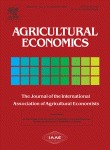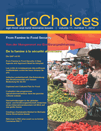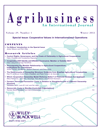
AGRICULTURAL ECONOMICS
Scope & Guideline
Advancing agricultural insights for a sustainable future.
Introduction
Aims and Scopes
- Economic Analysis of Agricultural Systems:
The journal emphasizes quantitative and qualitative economic analyses related to agricultural systems, including market dynamics, pricing strategies, and productivity assessments. - Sustainability and Resource Management:
A significant focus is placed on sustainable agricultural practices, resource management, and environmental implications, exploring how economic decisions impact ecological sustainability. - Rural Development and Policy Implications:
Research often addresses rural development issues, examining the effects of agricultural policies, market access, and socio-economic factors on rural communities. - Technological Impact on Agriculture:
The journal investigates the role of technological advancements in agriculture, including precision farming, digital tools, and their economic ramifications for farmers. - Food Security and Nutrition Economics:
Studies often explore the relationship between agricultural economics and food security, analyzing how economic factors influence nutritional outcomes and food availability.
Trending and Emerging
- Climate Change Economics:
There is a growing emphasis on the economic impacts of climate change on agriculture, exploring adaptive strategies and resilience-building measures among farmers. - Digital Transformation in Agriculture:
Research increasingly focuses on the role of digital technologies, such as mobile applications and data analytics, in enhancing agricultural productivity and market access. - Social and Behavioral Economics in Agriculture:
Emerging studies examine the behavioral aspects of farmers' decision-making, including risk preferences, social norms, and the impact of information dissemination. - Food Systems Resilience:
The journal is seeing a rise in research addressing the resilience of food systems in the face of disruptions, such as pandemics or economic shocks, and strategies for recovery. - Market Integration and Global Trade Dynamics:
There is an increasing trend towards analyzing the integration of agricultural markets on a global scale, focusing on trade policies, tariffs, and their economic implications.
Declining or Waning
- Traditional Agricultural Practices:
Research centered on traditional farming methods and practices has decreased as the journal shifts towards more innovative and technology-driven agricultural solutions. - Solely Local Market Analyses:
There is a noticeable decline in studies focusing exclusively on local market dynamics, as the journal increasingly emphasizes global supply chains and international trade impacts. - Static Economic Models:
The use of static models in agricultural economics has waned in favor of dynamic models that account for changing conditions and uncertainties in agricultural production. - Basic Agricultural Inputs Analysis:
Topics focusing solely on the analysis of basic agricultural inputs (like fertilizers and seeds) without considering broader economic interactions and outcomes have become less frequent.
Similar Journals

Agricultural Economics-Zemedelska Ekonomika
Advancing agricultural insights for a sustainable future.Agricultural Economics-Zemedelska Ekonomika is a prominent open-access journal published by the Czech Academy of Agricultural Sciences, dedicated to advancing the field of agricultural economics and related disciplines. Since its inception in 2007, this journal has provided a vital platform for researchers, professionals, and students to disseminate and engage with cutting-edge insights and empirical studies that contribute to the understanding of agricultural practices, economic theories, and policy analysis. With an impressive impact factor reflected in its 2023 quartile rankings of Q2 in both Agricultural and Biological Sciences and Economics, Econometrics and Finance, the journal ranks highly among its peers, specifically occupying the 46th position out of 288 in General Economics and 40th among 193 in Agricultural Sciences, highlighting its broad relevance and respected status. The journal's open access model ensures that research is widely disseminated and easily accessible, fostering an inclusive academic environment that encourages collaboration and knowledge sharing. With a commitment to publishing quality research until at least 2024, Agricultural Economics-Zemedelska Ekonomika remains a crucial resource for those dedicated to improving agricultural productivity and sustainability through economic insight.

EuroChoices
Bridging theories and trends for a sustainable future.EuroChoices, published by WILEY, is a leading journal in the fields of economics and geography, demonstrating a significant impact as evidenced by its exceptional rankings—Q1 in both Economics, Econometrics and Finance and Geography, Planning and Development for 2023. With an ISSN of 1478-0917 and an E-ISSN of 1746-692X, this esteemed journal has been a pivotal platform for scholarly discourse since its inception in 2003, evolving thoughtfully to encompass contemporary issues and trends through 2024. Situated in the United States, it serves as an essential resource for researchers, professionals, and students alike, offering insights that bridge economic theories with geographical perspectives. While it maintains a traditional publishing approach without open access options, the journal continues to thrive, achieving high ranks in Scopus—with Economics positioned 37th out of 242 and Geography at 151st out of 821—highlighting its role as a critical contributor to the academic community.

China Agricultural Economic Review
Championing Research for Sustainable Agricultural FuturesChina Agricultural Economic Review, published by EMERALD GROUP PUBLISHING LTD, is a premier journal that holds a significant position in the fields of agricultural economics and biological sciences. With its ISSN 1756-137X and E-ISSN 1756-1388, this journal has dedicated itself to advancing academic discourse since its inception in 2008 and continues through 2024. It boasts an impressive Q1 ranking in both Agricultural and Biological Sciences and in Economics and Econometrics, reflecting its high-quality research contributions, as evidenced by its standing in the top percentiles of Scopus rankings (97th and 92nd, respectively). Aimed at fostering scholarly exchange among researchers, professionals, and students, the journal invites original research articles, reviews, and case studies that explore vital issues and developments impacting agricultural economies, with a keen focus on both theoretical and practical advancements. As a well-regarded platform within the United Kingdom, the journal promotes accessibility and encourages significant contributions to enhance the understanding of agricultural economic dynamics worldwide.

Bio-based and Applied Economics
Empowering Policymakers with Evidence-Based InsightsBio-based and Applied Economics, an esteemed journal published by FIRENZE UNIV PRESS, is an open-access platform dedicated to the dissemination of innovative research and critical reviews in the interdisciplinary areas of agronomy, animal science, and food science, with a strong emphasis on the economic and environmental implications of bio-based applications. Since its inception in 2012, the journal has positioned itself as a valuable resource for academics and professionals alike, boasting a commendable Q2 ranking across various fields, including Economics, Environmental Science, and Applied Biological Sciences. With its notable impact factor and commitment to accessible research, it aims to foster knowledge exchange and stimulate advances in bio-economy practices. This journal not only contributes significantly to scholarly discourse but also serves as a crucial tool for policymakers and industry leaders seeking evidence-based solutions to contemporary challenges in sustainability and resource management.

Studies in Agricultural Economics
Innovative Insights for Sustainable AgricultureStudies in Agricultural Economics is a premier journal published by AGRARGAZDASAGI KUTATO & INFORMATIKAI INTEZET in Hungary, focusing on innovative research in the interdisciplinary fields of agricultural, biological, and economic sciences. Since becoming an Open Access journal in 1997, it has aimed to enhance the visibility of agricultural economics scholarship while promoting global engagement among researchers, practitioners, and policymakers. With its robust Q2 and Q3 rankings across varied categories including Development and Geography, this journal serves as a significant platform for disseminating cutting-edge studies that address crucial issues in agriculture and rural development. The journal's continuous publication since 2011 until 2024 exemplifies its commitment to providing timely insights into evolving agricultural challenges. With a strong Scopus ranking across multiple domains, particularly in the social sciences and agricultural sectors, it stands as a vital resource for anyone looking to advance knowledge and practice in these critical areas.

Agribusiness
Pioneering insights at the intersection of agronomy and economics.Agribusiness, published by WILEY, is a premier academic journal dedicated to advancing the fields of agronomy, animal science, food science, and economics within the context of modern agricultural practices. With its ISSN 0742-4477 and E-ISSN 1520-6297, the journal has established a strong reputation since its inception in 1985, featuring high-quality, peer-reviewed research that informs evidence-based practices in various segments of the agribusiness industry. As a Q1 journal in multiple categories such as Agronomy and Crop Science, Animal Science and Zoology, Food Science, and Geography, Planning and Development, it is positioned at the forefront of academic inquiry, making significant contributions to our understanding of agricultural systems, economic viability, and environmental sustainability. Currently indexed in Scopus, Agribusiness ranks favorably among its peers, reflecting its influence and the quality of research it publishes. Although not an Open Access journal, it remains an essential resource for researchers, professionals, and students seeking to navigate the complexities of agricultural economics and resource management. With an engaging scope and commitment to excellence, Agribusiness continues to shape the future of the agricultural sector.

JOURNAL OF AGRICULTURAL AND RESOURCE ECONOMICS
Cultivating insights that shape the future of agriculture.Journal of Agricultural and Resource Economics is a pivotal platform in the realm of agricultural and resource economics, published by the Western Agricultural Economics Association. Since its inception, the journal has embraced an Open Access model, fostering widespread dissemination of research findings to benefit both scholars and practitioners in the field. The journal operates within an impressive global ranking framework, resting in Q2 across several pertinent categories including Agronomy and Crop Science, Animal Science and Zoology, and Economics and Econometrics. With its ISSN 1068-5502 and E-ISSN 2327-8285, it has garnered attention for its rigorous academic standards and impactful contributions to the discourse on resource management and agricultural practices. Researchers, professionals, and students alike will find the journal's ongoing commitment to advancing knowledge invaluable, with publications that span from 1996 to 2024 capturing evolving trends and insights in the sector.

NJAS-Impact in Agricultural and Life Sciences
Connecting researchers to foster impactful agricultural innovations.NJAS-Impact in Agricultural and Life Sciences is a pivotal open-access journal, published by Taylor & Francis Ltd, focusing on the interdisciplinary nexus between agricultural practices and life sciences. Anchored in the United Kingdom, this journal aims to provide a comprehensive platform for the dissemination of innovative research that addresses critical challenges in environmental sustainability, agricultural productivity, and biological advancements. With its inaugural issue dated from 2023 to 2024, NJAS prominently features the latest empirical studies, reviews, and theoretical contributions that enrich existing knowledge and provoke thought among researchers and practitioners alike. Although currently ranking within the lower percentiles across various Scopus categories, the journal aspires to establish itself as a significant contributor to the dialogue on agricultural and environmental sciences. As scholars in these fields seek to bridge the gaps in understanding, NJAS invites submission from diverse perspectives, underscoring the importance of collaborative knowledge-building in addressing the complexities of our changing global landscape.

Scientific Papers-Series Management Economic Engineering in Agriculture and Rural Development
Shaping the Future of Agriculture through Open Access InsightsScientific Papers-Series Management Economic Engineering in Agriculture and Rural Development is a premier open access journal dedicated to advancing the field of agricultural and rural development management. Published by the University of Agronomic Sciences and Veterinary Medicine Bucharest, this journal has been a valuable resource for researchers, practitioners, and students since its inception in 2009. With a focus on the integration of economic engineering principles into agricultural practices, the journal aims to provide innovative solutions and insights that address contemporary challenges in rural development. While the journal's H-index and specific Scopus rankings are not listed, its open access format ensures that cutting-edge research is readily available to a global audience, facilitating engagement and collaboration across disciplines. Located in the heart of Romania, the journal serves as a critical platform for disseminating impactful research and fostering dialogue in the ever-evolving landscape of agriculture and rural development.

Agricultural and Food Economics
Empowering scholars with cutting-edge findings in food economics.Agricultural and Food Economics is a leading journal published by SPRINGERNATURE, dedicated to the advancement of research in the interconnected fields of agriculture, food systems, and economic analysis. Established in 2013 and operating under an Open Access model, this journal serves as a vital platform for scholars and practitioners to disseminate innovative findings and insights that influence policy and practice. With a notable impact reflected in its 2023 quartile rankings—Q1 in Agricultural and Biological Sciences (miscellaneous), Q2 in Economics and Econometrics, and Q1 in Food Science—this journal is recognized for its rigorous scholarly output. It ranks among the top resources in its domain, with Scopus ranks placing it in the 88th percentile for Agricultural and Biological Sciences and the 79th percentile for Economics. The journal covers a broad spectrum of topics, including sustainable agricultural practices, the dynamics of food markets, and the economic implications of food policies. Researchers, professionals, and students alike will find valuable insights and comprehensive analyses that contribute to the ever-evolving discourse on food and agriculture.